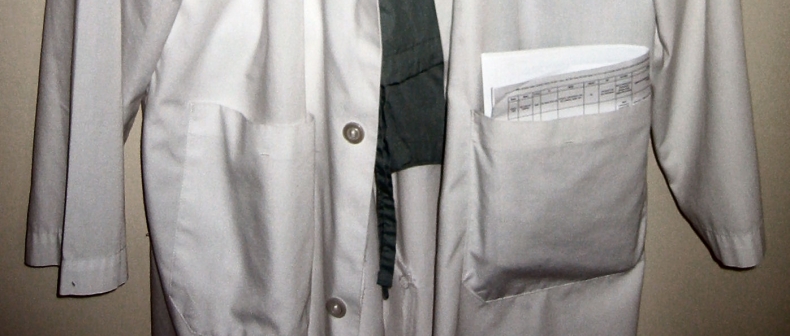
Credit: Wikipedia
I have always wanted to be a scientist. I am the offspring of two scientists, which means I am genetically predisposed to think lab coats are hotter than, I don’t know, six-packs. I actually find conducting experiments and thinking about theories fun. And yes, I was once that kid with unfortunate glasses who took bio, chemistry, and physics in high school with gusto.
But after a full-time stint working in the field I believed to be my jam (neuroscience, hey!), I have decided a scientist’s life is not the life for me.
Apparently I’m not the only one. A report from the Association for Women in Science just announced some pretty miserable statistics on the work-life balance and career satisfaction of those working in the sciences. The report is based on a survey profiling 4,225 researchers from around the world and across science disciplines. And the results aren’t pretty.
Some 48 per cent of women in research reported being unsatisfied with their work-life balance, while 39 per cent of men felt the same. A total of 54% scientists said that work conflicted with their personal lives at least two to three times a week.
That’s why some people just end up leaving. Dan Wan was a biology student specializing in plant sciences at Imperial College London last year. He decided to leave academic science altogether, and now works in television, producing science documentaries for networks like Discovery and National Geographic.
“Having my head stuck in fume cupboards and tissue culture hoods from 9 a.m. to midnight at times daily wasn’t my cup of tea,” says Dan. “Having loads of friends doing similar jobs meant it was near impossible to line up even 15 minutes for lunch and sometimes even a drink down the pub afterwards. Sacrifices did have to be made, and you have to be dedicated to the cause to enjoy it.
“Sometimes it got to the point where you just didn’t have time for lunch, and you’d have to eat or see friends for a few seconds between experiments. I loved the theory of what I was doing but the practical side just didn’t click with me.”
One in 10 respondents in the AWIS survey said they expected to leave their current position within a year. Of these, 9% said they were leaving because they weren’t able to balance their work with the rest of their lives.
When I was doing full-time in the neuroscience lab, I was working 12-hour days. We were fighting against grant deadlines, publication deadlines, and our human tendency to, uh, take a break. But we didn’t really have a choice. Decreased funding in most fields means that more people are competing for the same research grants. So the more hours you put in, the more grants you can apply for, and the more articles you can publish. Then it’s publish or perish, etc.
Not all labs are like that, but a frightening number of them are. In August, the heavyweight science journal Nature featured a series of pieces on “24/7 lab” culture. It’s a lifestyle where working inhuman hours is actually considered sexy. One article featured an interview with Baltimore-based neurosurgeon Alfredo Quinones-Hinojosa, who’s famous for his 140-hour weeks, and for the fact that his three young kids thought he lived at the hospital. He’s also published 113 articles in six years.
For a field where the superstars are people who thrive on having no outside life to speak of, it bodes badly for anyone with interests outside of the lab. When you do focus too much on other pursuits, your career suffers. That was the case for over 30% of the AWIS survey respondents, who reported that having kids or taking better care of their work-life balance had a negative effect on their careers.
But the problem with working this hard isn’t just about the scientists themselves. I’m wondering about science research itself. How good can your study be when it’s written up at four in the morning, on two hours of sleep? What are the chances you’ll make a mistake while analysing your data, or worse, performing a surgical procedure?
My supervisors speak of a time when they’d pause for long afternoon breaks over coffee with their profs, just to relax and talk about ideas, scientific or otherwise. Those breaks let them be creative, and as a result they did good, penetrating science.
When I think of how those days must have been, I imagine them in sepia. Today we don’t have the time for major creative insights. Instead it seems we do the same one experiment as many times as we can, with minor technical variations that will justify writing up a handful of publications. It feels like we’re sacrificing the science as much as we’re doing to the scientists.
“Once the novelty of wearing a long white coat all day wore off,” says Dan, “days became long and boring. Plus, I felt like I was losing any creative sensibility I ever had. I wanted to do something where science was still relevant but creative at the same time; I think TV is a nice balance.”
It’s hard to abandon a field entirely when you really did love its theories in the first place. So perhaps I’m doomed to become one of those people who follow academic science journals on twitter, wondering how to publish my first lab coat harlequin. Come to think of it, I actually wouldn’t mind.
____
Erene Stergiopoulos writes for Toronto Standard. Follow her on Twitter @fullerenes.
For more, follow us on Twitter at @torontostandard, and subscribe to our newsletter.











